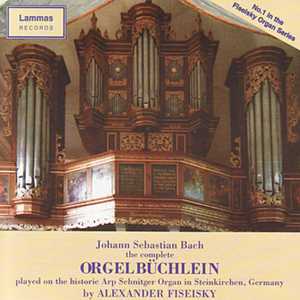The Complete Orgelbüchlein

45 Chorale Preludes by Johann Sebastian Bach played on the historic Arp Schnitger organ in Steinkirchen, Germany
Total playing time 80m
The Complete Orgelbüchlein
Played by Alexander Fiseisky
The Complete Orgelbüchlein
Johann Sebastian Bach's Orgelbüchlein, the most significant collection of chorales in the form of the so-called small organ chorale, is one of those works which generations of organists have grown up with.
In the collection's preface the author emphasises two aspects which he considered to be important: "...instruction..., in the execution of a chorale in many different ways" and "in such chorales as are to be found herein, the pedal is to be treated as obligatory". Though it is signed Autore Johanne Sebast. Bach, P.T. Capellae Magistro, S.P.R. Anhaltini Cotheniensis the music mostly was written earlier than his time in C=F6then, presumably in 1713-16 when Bach was at the peak of his career as an organist of Weimar court (1708-17). However, the unique role of this cycle both for interpreters of his music and for Bach himself was recognised not only because the composer managed to reach a perfect musical result and achieve the aims he had announced, but most of all because in this collection he was able to create a complete system of expressivity which allowed him to reproduce the concentrated musical interpretation of the text. Albert Schweitzer was probably the first who pointed out that in Orgelbüchlein one could find an encyclopedia with the motifs of Bach's musical vocabulary.
There are at least two important reasons why the manuscript of Orgelbüchlein (Deutsche Staatsbibliothek, Berlin; Mus. ms. autogr. Bach P 283) which was planned out for 164 chorale arrangements was never finished. One is that Bach left his post as organist in Weimar where he was generally required to provide "regularised church music in God's honour" and during the next period (1717-23) devoted himself to other musical activities. The other "inner" reason was connected with the composer's main creative principle which did not allow him to repeat in any later composition an idea which had already been fully realised in another earlier piece. Actually in those 45 written preludes from Orgelbüchlein (not counting BWV 633 as a variant of BWV 634) Bach had already exhausted the fundamental formal possibilities of the genre of the small organ chorale.
As we have it now the whole book is based on the chorales of the central body of Protestant church hymns which tell the story of Jesus Christ and produce a complete picture of his life. The chorale preludes of the Orgelbüchlein follow the order of the hymnal. The latest research suggests that Bach's model was an edition of the Thuringian Hymn Book of about 1675.
Alexander Fiseisky
Lobcovo, Moscow, July 1997
Alexander Fiseisky
Born in Moscow, Alexander Fiseisky has become one of Russia's premier and most influential organists and has gained strong international recognition, having played in over 30 countries and giving about a hundred recitals a year. He studied piano at the Moscow State Conservatoire under Professor Vera Gornostaeva and organ under Professor Leonid Roizman. He had further guidance and masterclasses from Wolfgang Schetelich, Leo Kremer, Daniel Roth and Jean Guillou.
Alexander Fiseisky is the official organ soloist of the Moscow State Philharmonic Society and in this capacity he has played with many orchestras, instrumentalists and singers. A significant number of premieres of works that he has given have been dedicated to him - including compositions by Mikhail Kollontay, Vladimir Ryabov and Arif Mirzoyev. He has performed at many of the major festivals in the former USSR as well as in Washington, London, Prague, Berlin, Vienna, Copenhagen, Gdansk, Tokyo etc.
He regularly appears as a jury member of national and international organ competitions including Calgary International Organ Festival (Canada), St. Albans International Organ Festival (United Kingdom) and Gelsenkirchen International Organ Competition (Germany). His lectures and masterclasses at the Royal Academy of Music in London and Oundle International Organ Festival (UK), Musikhochschule Vienna (Austria), Musikhochschule Hamburg (Germany), Peabody Conservatoire in Baltimore (USA) etc. established his international reputation both as a tutor and musicologist.
Alexander Fiseisky has many recordings to his credit, including the complete organ works of J. S. Bach. He also continues to be nationally involved in organ matters in Russia, organizing a number of festivals and scientific conferences. He is strongly advocating the introduction of the best of Russian organ tradition to the West by editing an Anthology of Russian Organ Music for the publishers B=E4renreiter-Verlag (8217-8219).
Alexander Fiseisky, D.M.A.
Soloist of the Moscow State Philharmonic Society President of the V. Odoyevsky Organ Centre
Produced by Alexander Fiseisky
Recorded and edited by Lance Andrews